- Home
- Michelle Tea
Mermaid in Chelsea Creek Page 8
Mermaid in Chelsea Creek Read online
Page 8
Sophie paused, waiting for Ella to bust up into laughter. Was she joking? She sounded like an airhead.
Listening to herself talking to Sophie, Ella could hear how dumb she sounded, but she couldn’t help herself. There was something exhilarating about giving herself over to such talk and feelings. The boy’s attentions had electrified her, his steady dark eyes and his husky voice as he traded his pizza for a cigarette. She could feel another girl rising inside her, dumber in some ways and smarter in others, haughty and confident, a flirt. She supposed she’d flirted with the boy, and it had worked—he’d seemed both flirtier and shyer when he’d left, after smoking his cigarette down to the filter and tossing the butt into the frothy waves. Ella’s body buzzed from the interaction like a hive of yellow jackets swarmed through her, beating their tiny wings. The rash her last scrubbing spell had left upon her was minor, no one noticed it, she could pretend it was gone and that the girl who’d done it was gone, too, that she was through with all that, and she wouldn’t let such craziness overtake her again.
“Okay.” Sophie laughed. She sounded almost nervous. “Well, ah, I was at the dump all day.”
Ella had forgotten to stay mad at her friend for telling their secret and getting herself punished. She’d missed her at the beach, at first, but then, later, when the boys showed up, she’d been grateful Sophie wasn’t around. How could Ella have tried on this new personality in front of Sophie, who knew her so well? Sophie who knew she was a nerd, scared of most everything, had never exchanged a germy kiss with anyone. Sophie would have kicked her with her foot and crossed her eyes at her, and the boy would have decided they both were freaks, and he would have been right. Ella felt guilty to be glad about her friend’s punishment, but she was. “That sucks,” she said unconvincingly. “What, did you, like, hang around in trash all day? What even happens there?” Ella shuddered at the thought, feeling the incoming crave of another nic fit.
“There’s a glass recycling place, and this person Angel operates it, and she’s, like, a girl, but she looks like a boy, she’s really cool. And she gave me this amazing, like, jewel—not a jewel, it’s glass with a seashell in it, and there’s all this tumbled glass and it’s so beautiful.”
Ella found it hard to concentrate on her friend’s breathless report. Her sister and her cousin were chasing each other in and out of her bedroom, and she could hear a new thread of gossip being shared in the kitchen, the voices rising tantalizingly higher with outrage at someone’s scandalous behavior. And beneath the hum of her house, Ella thought Junior Junior Junior Junior, feeling the sear of the boy’s presence strong as her sunburn. She tried to focus. What had Sophie said, something about a girl that looks like a boy?
“What, are you working with a lesbian? Watch out she doesn’t make a grab for you, Sophie!”
“Don’t be a jerk.” Sophie felt protective of Angel. “I don’t know if she’s a lesbian.”
“Girls who look like boys are leeeesbians, trust me. My Auntie Bertie looks just like a boy, and she is a total les and she likes to make a grab at the girls, so you be careful!” Ella laughed. “A lesbian! The dump sounds more exciting than I thought it would be.”
“It is,” Sophie said. She couldn’t tell if Ella was being mean about Angel or not, but she decided to not talk any more about it. “Anyway, I’m so bored. My mother fell asleep in front of the television again.”
“Whooo,” Ella made a noise. “That woman likes to snooze. I wish these people over here would take a nap. Can you hear how loud it is?” Sophie could.
“I wish we could meet up,” Sophie said, suddenly longing for her friend.
“We could sneak out,” Ella said. “Later?”
Sophie bit her lip. She was already in so much trouble, banished to the dump all summer. She was conflicted over how she should behave as a result of this punishment. Should she be contrite and rule abiding to show her mother—what? That she was sorry? She wasn’t sorry, exactly. She didn’t think her punishment fit her crime. And if she was already punished for the duration of the summer, why should she behave? Sophie realized that if she didn’t sneak out to see Ella she could forget about having a best friend. Ella would never, ever, ever come to the city dump, and look how different she already was, after just a single day at the beach without her? If Sophie let go of her, Ella would wind up—what? Sophie pictured an even tanner Ella, her dark skin oily and coconut, her long hair teased out Chelsea-style, cigarettes stuck into the hairsprayed mess of it like barrettes. Ella would wind up vapid, uninteresting, and pregnant. Pregnant? Sophie felt like it was a betrayal of her best friend to even think such a thought, but the thought was there—Ella pregnant, by the end of the summer.
“Let’s meet at the creek,” Sophie said. “Where we met last time.”
Ella didn’t like the thought of that place, with its condoms and filthy water and the memory of her friend’s face-plant in the muck. But she could think of no where else to go. Street corners were patrolled by cops and cluttered with kids. Parks were locked, and too easy to get busted sneaking into them. The creek was pretty perfect. Ella wished they could just go back to the beach, and sit on the wall in the dark, straining their eyes to see where the black sky met the black ocean on the black, black horizon. Maybe Junior would be drawn back, too, looking for her. She tried to shake the boy out of her head, stay the Ella she was for Sophie, not the Ella she was that day at the beach. “Okay,” Ella said. “I’ll meet you there once the sun goes down.”
Chapter 8
The trick to doing something you’re totally not supposed to do is acting like it’s the most natural thing in the world, like you have every right to be doing it, whatever it is. Sophie pushed her feet into her Vans and passed her mother, asleep on the couch. Her heart pulsed at the sight of Andrea in her work clothes, her head at an odd angle on the couch. It had to be uncomfortable. The woman had to be truly exhausted to have fallen asleep in such an awkward pose, oblivious to the blare of the TV. Sophie thought of turning it down, but then maybe the noise was keeping her mother asleep. What was it about the way Andrea looked, her sleeping mouth open, drool wetting the corners? She looked vulnerable. It gave Sophie a strange, sad feeling. She clicked the door closed gently before she left, praying that her mother wouldn’t stir awake at the sound.
Ella’s strategy was different. The coffee-drinking, gossiping relatives clustered around her kitchen table would stay there long into the night. As distracted as they might be with their lively conversation, they were never too distracted not to know the exact whereabouts of every child in the house. Ella stationed herself with a magazine on the hall floor outside the bathroom. Tia Lucy came by first.
“What are you doing, sitting on the floor by the bathroom?”
Ella slapped shut her magazine with a sigh. “It’s so loud in here,” she groaned. “I can’t even read a stupid magazine. I keep reading the same sentence again and again.”
Tia Lucy clucked her tongue in sympathy. “I hate that,” she said. “You should go over to my house, it’s empty. I got lemonade in the fridge, help yourself. You’re too big to play with the kids and too little to sit with us old ladies.” Tia Lucy laughed as she slid into the bathroom. What a joker. Tia Lucy was hardly an old lady at all. She had long hair she wore in an intricate combination of braid and bun at the back of her head, the better to see the earrings swaying from her ears. Her eyes were lined in blue and she reminded Ella of a bird. Not a dirty Chelsea pigeon but a beautiful, quick bird from a tropical island.
Tia Shirley came next. “What are you doing, reading in the dark? Turn a light on! You’re going to ruin your eyes!”
Ella slapped shut her magazine with a sigh. “The lightbulb burned out. And I can’t read in my room because Tracy and Junior are playing in there, and I can’t read in the living room because Tio Matty and my father are watching something, and I can’t read in the kitchen because you all are so loud.”
Tia Shirley put her hand on her heart and worried her brow
, as if a terrible dilemma was before them. “Ella! There has to be a place for you, too! Why don’t you go to my house? Your Tio is sleeping and you can stay on my back porch with the light and read your magazine. Go—I’ll tell your mother.”
“Okay, I probably will,” Ella said.
Sitting on the floor in the hallway, Ella received invitations from two more of her aunts to go and read her magazine at their home. So when she stood at the door, her hand twisting the knob, and hollered into the kitchen, “Okay, I’m going to your house to read my magazine, be back in a couple hours!” the women at the table cried back, “Okay, be careful!” in unison, and Ella walked out the door and headed toward the creek.
* * *
THE SKY OVER Chelsea was extra dark; occasionally the landscape would shift enough for the moon to peek through, illuminating the mass of clouds suffocating its light, and then the cloud cover would spread itself again, and the sky would return to blackness. The glow of the streetlights seemed puny, throwing dim yellow halos around the bulbs but casting hardly any light to the ground. By the time she reached the hole in the chain link, Sophie was going on instinct and memory—beyond the tear in the fence, a shapeless chunk of cement; a bit further, a toppled shopping cart. For a second the clouds shifted, and the moonlight caught on an empty bottle and shone through it to illuminate the path that wound through the tall weeds to the scabby little creek. Sophie headed out on it, wishing that she could smell the water but sort of grateful, she supposed, that she couldn’t, it was so thin and dirty. They were so close to the ocean in Revere, so close to the harbor on the East Boston border, but Sophie and Ella needed the privacy of the creek, their own body of water.
Ella lived closer to the creek and was there already, halfway through a cigarette. When she hugged her, Sophie could feel the day’s sun radiating off her skin. Ella smelled like the tanning oil that stuck stubbornly to her arms, and like the scented lotion she slathered on top of it. Her hair smelled like shampoo and her cigarette smelled slightly of strawberry from the gloss on her mouth. Ella smelled like a girl. Sophie couldn’t imagine what she herself smelled like. She lifted her arm and huffed her armpit.
“Nice,” Ella commented wryly. “Classy.”
“I think I have to start wearing deodorant,” Sophie mused. “Now that I have a job and stuff.”
“Wait, so that’s your actual job?” Ella asked. “Like, you’re getting paid?”
Sophie hedged. “No, I’m not getting paid. But I’m working.”
Ella snorted a last bit of smoke from her nose, like a dragon, and flung her butt in the creek. “That’s not a job, Soph. That’s slavery. There are child labor laws. I bet you could call social services on your mom and they would take you away like that.” Ella snapped her fingers. “Think of it—single mom sends her daughter to the city dump to work, underage, without pay, for her wicked grandmother.”
“It sounds so bad when you say it like that,” Sophie agreed. “But it just feels like being grounded, you know?”
“No, Sophie. Really. Think about it. This could be your lucky break. Social services could take you and place you with, like, some family in the country or something. Or out where the ocean is really pretty, you know, where it’s clean. You could have a dog, and your own room, and food, and I bet the people would be, like, so nice, just really nice people who want to save teenage girls from working at the dump.”
Sophie joined the fantasy. “Or a family in Cambridge,” she said dreamily. Ella wrinkled her nose.
“Cambridge is busted,” she said. “That’s where Ben Affleck is from.”
“Not that part,” Sophie insisted. “The good part of Cambridge, where Harvard is. Maybe I could get adopted by Harvard professors. They’d have a whole room of books, like a library. And real art on the walls, and I’d have my own room and have a pet, even. A dog.”
“A smart dog,” Ella offered. “Not some dumb fucking dog.”
“Yeah,” Sophie said. She imagined herself curled up in a sunny room with a smart dog gazing at her lovingly while she read a really difficult book that she totally understood.
“Or you’d just get thrown in with some pervert and wind up molested,” Ella said.
“Or with one of those couples that live off their foster kid checks,” Sophie concurred. “Like, in a house with fifteen other foster kids. Really awful kids who’d torture cats. Like, put firecrackers up their butts or something.” Sophie shuddered. “People do that, you know.”
“Foster-kid hoarders are creepy.” Ella nodded grimly. “You’re better off where you are.” Ella pulled a green hair elastic from where it sat on her wrist like a bracelet, and pulled her hair into a shiny loop atop her head. “Let’s get to it,” she said. “I want to go first. I didn’t even get to pass myself out last time.”
Sophie looked uneasily at her friend. “I don’t know, Ella,” she said. “I’ve been having some weird things happen to me…”
“You said the doctor told you it was no big deal. You told me she passed herself out when she was our age. And look at her! She’s a friggin’ doctor!”
“I know…” Sophie was feeling wimpy. There was no way to deny it. She felt a wimpy look settle across her face, part a squirmy sort of fear, part shame at the fear, with a tinge of a plea for mercy from her merciless friend.
“Don’t wimp out on me, Swankowski,” Ella said sternly. “If I don’t play pass-out with you, who will I play with? Come on, it’s still fun, don’t you think?”
Sophie recalled the dreamy visions and the sweet body-buzz. She did think it was fun. But passing out felt linked now with those strange feelings and visions, and that desperate need for salt. When she had fixed her bowl of cereal earlier that evening, after her mother had drifted into the living room, Sophie had swiped at the fat, round salt canister in the cupboard and plucked out the spout, sending a fall of the stuff into her Cheerios. Weird. But it had been delicious.
“Just one time,” Ella pushed. “Once for me and once for you. Come on, why did you even want me to meet you out here, if not to play pass-out?”
“Because we’re friends,” Sophie said dumbly.
“Yeah, we’re friends, and this is what we do when we hang out. I smoke and talk too much, you don’t smoke and listen to me, and we pass each other out.” Ella flicked her lighter in the dark, casting enough light for them to find a slight clearing free of dog poop or condoms or jagged smashed bottles. Smaller bits of glass sparkled in the light and reminded Sophie of the recycling shack, of Angel and the tumbler and the bright bins of glass, and she found herself actually excited to return.
“Okay,” Ella said. With her knees in the dirt Ella bent her head and began her huffing and puffing. When she flung herself up Sophie tensed behind her, waiting for her body to begin its slump, to catch her and lay her gently on the ground. She did. She pushed some weeds aside so that they framed her face. Ella, she realized, was beautiful. She always had been, and Sophie had always known it, but Ella’s beauty had always been neck and neck with Sophie’s own. Looking down at her friend’s cheeks, the relaxed pout of her mouth, the way her lashes swung up at her smooth eyelids, rapid with the movement of her dreaming, Sophie thought that Ella’s beauty had pulled ahead, was in the lead, would almost certainly win.
Ella’s eyes shot open, and Sophie felt like she’d been caught doing something creepy, staring at her friend while she was gone. “What?” Ella demanded.
“Nothing,” Sophie said, nervously. “You were out for a while, I was just checking on you.”
“How long was I out for?”
“Like, five minutes, maybe ten,” Sophie lied.
Ella thought about it, then shrugged in the dirt. “I felt like I was out for five or ten hours,” she said.
“What did you see?”
“Nothing. Maybe a dog. Yeah, a dog, a big sweet dog. God, I want a dog so bad,” Ella mourned. “My mother is such a cat person, she’ll never let me get one.” Ella closed her eyes, trying to get back to the
fading sensation of some soul mate dream-dog. “It felt so nice to be next to it!”
The thing about playing pass-out was it felt so nice to be next to whatever was in your dream. Once Sophie had gone under and had a vision of a kitchen table. She came out of it filled with a tender, almost mystical affection for the furniture. It was the weirdest thing. But Sophie could see her friend getting a little hooked on the dream dog. At least she hadn’t had a vision of the beach boy, Sophie thought. That would for sure be unbearable.
“Go,” Ella said to Sophie, arranging herself on the ground. “I got you.”
Sophie resisted laughing as she began to pant and huff. Her hair did not cascade to the ground like Ella’s; she felt loose strands catch and bunch around the snarls, like seaweed caught on a rock. Her heavy breaths puffed the dust of the ground back up into her face. She sat back on her heels and held her breath, gripping the edges of her throat tightly. She felt it in her face first, a hot tingle. Next in her hands, they seemed to disintegrate, atom by atom vanishing with a lovely shimmer, followed by the rest of her body, buzzing and gone. Sophie was faintly aware of Ella’s hands on her, laying her down. She was in a fluid place, slow and liquid, a cave perhaps. She was underwater. Things floated around her slowly, things too dark to see, but before her eyes one simple thing glowed, a starfish trapped in a hunk of sea glass illuminating the bare chest of a wild-haired mermaid. The sea glass cast a pale blue light, giving the fish-belly-white skin of the mermaid a sickly fluoresence.
Sophie thought her hair had problems. The creature’s inky mane hung suspended in the water around her head. Tangles unraveled into long, tough locks, only to join once more in a round weave of snarl, snarls stuck with slimy ropes of seaweed, with fragments of seashells and urchin shells and the curving, fragile bones of fish. Her endless hair floated out past her tail, which was a great and muscled thing, shining in places and dull in places, sometimes healthy and sometimes looking like a fish kept in a neglected aquarium, its body coming off itself in ghostly tendrils.

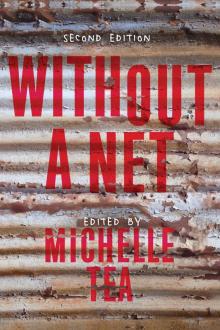 Without a Net
Without a Net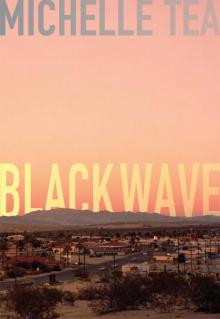 Black Wave
Black Wave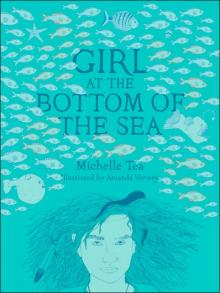 Girl at the Bottom of the Sea
Girl at the Bottom of the Sea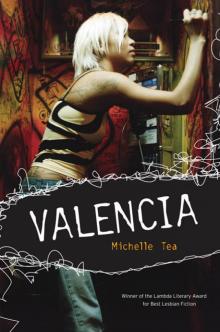 Valencia
Valencia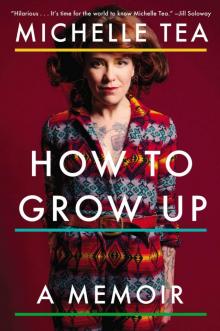 How to Grow Up
How to Grow Up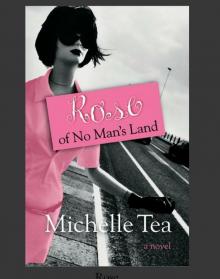 Rose of No Man's Land
Rose of No Man's Land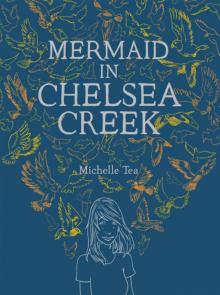 Mermaid in Chelsea Creek
Mermaid in Chelsea Creek